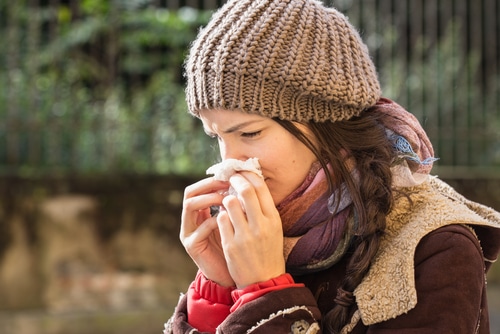
COLDS
A Cold is the most frequent infectious disease in humans, a viral disease of the upper respiratory tract, and primarily affects the nose. The most common symptoms include nasal congestion or stuffiness, sneezing and/or runny nose. Adults and children with colds generally have minimal or no fever while infants and toddlers may run a fever in the 100-102 degree range. Symptoms usually being in one to five days after “catching” a cold and usually clears up by itself in about seven days. Some patients may experience a lingering of symptoms, such as cough, for another week. Over the counter pain relievers, anti-inflammatory, and/or decongestants (ie: Tylenol, Aleve, Advil or pseudoephedrine) may offer patients relief of their symptoms. If symptoms continue past seven days, this maybe signs of another problem such as allergies or sinus infection, and should see a doctor.
ALLERGIES:
Allergies are one of the most common yet most overlooked diseases in the U.S. affecting up to 50 million annually. The St. Louis metropolitan area consistently ranks among the highest affected cities for allergy problems.
Allergy symptoms appear when the immune system reacts to an allergic substance such as pollen, food, mold, dust, feathers, and animal dander. The immune system mistakes these substances are being harmful and reacts, resulting in symptoms of itchy, watery eyes, nasal and sinus congestion, headaches, sneezing, hives and even shortness of breath. These symptoms may appear during the spring or fall pollen season or year round. Fever rarely accompanies allergies and the symptoms can be alleviated with a wide range of medications. For patients who have regular symptoms, I suggest performing a simple test to determine if allergies are the cause. Once allergies are confirmed, avoidance techniques can be implemented along with effective medications (both over-the-counter and prescription) to help alleviate symptoms.
For patients who have persistent symptoms, immunotherapy is an effective option. Immunotherapy is when a patient is given a tiny amount of a substance/allergen (via shots or drops) to which they are allergic, enough to stimulate their immune system but not so much as to cause a full-blown allergic reaction. Over time, their immune system will build up a tolerance to the allergen, and allergy symptoms will diminish.
SINUSITIS/SINUS INFECTIONS
Sinusitis affects millions of Americans each year. It is a highly symptomatic disease that has a dramatic impact on quality of life.
Sinuses are four pairs of hollow spaces found in the facial region around the nose and eyes. Like the inside of your nose, sinuses are lined with a thin layer of tissue called the mucous membrane, which produces mucous. The mucous flows out through the openings of the sinuses into the nose. The mucous is what helps protect us from pollens, pollutants, molds, dust and germs found in the air we breathe. When these openings become blocked, your sinuses may become infected and are often dramatically affected. Anything that causes swelling in the nose can block the openings between your sinuses and your nose, including a cold, an allergic reaction or a reaction to some chemical to which you’ve been exposed. The blockage causes air and mucous to become trapped within the sinuses, which may trigger painful symptoms.
The most commonly experienced sinus-related symptoms are:
- Nasal discharge (drippy nose or post-nasal drainage)
- Congestion
- Lack of energy/fatigue
- Headache
- Facial pressure or pain
- Sore upper teeth
- Inability to breathe through one or both sides of your nose
- Discolored nasal drainage
Sinusitis requires a physician’s diagnosis and may require treatment with an antibiotic to cure the infection and/or medications to treat the symptoms. For patients who are frustrated with persistent sinusitis, they may benefit for a procedure called Balloon Sinus Dilation. This procedure is performed at the St. Louis Sinus Center, is covered under most insurance plans, offers permanent resolution for the majority of patients, and patients return to normal activities the next day! My office has been recognized as a National Center of Excellence for performing this procedure and hundreds of patients have found lasting results with the procedure.
What are the best over-the-counter allergy medicines?
For patients suffering from sneezing, runny nose and/or watery eyes there are two main over-the-counter allergy medications which offer effective symptom relief. These antihistamine medications include:
- Allegra (fexofenadine as the generic name)
- Zyrtec (ceterizine hydrochloride as the generic name)
- Adults have the option of adding a “D” or pseudoephedrine tablet to alleviate congestion symptoms
For patients suffering from severe itchy and/or watery eyes and haven’t found symptom relief from oral medications, there are a few eye drops available. They include:
- Zaditor (ketotifen fumarate as the generic name)
- Alaway (ketotifen fumarate as the generic name)
When should you see a doctor?
Patients should see a doctor when symptoms last longer than 10 days and/or when the symptoms return time and time again.
What’s the most important message you want readers to know about diagnosing and treating allergies and sinus problems?
Colds are common and happen to just about everyone from time to time. Fortunately, they don’t last long and simple over the counter medications can ease the symptoms. On the other hand, patients with allergies and sinusitis often suffer from recurrent or chronic symptoms, which have a huge impact on quality of life. Fortunately, allergies and sinusitis have a root cause, which can be minimized or resolved by a trained physician. With today’s advanced treatments and minimally invasive procedures, patients shouldn’t have to suffer. They should seek resolution.


